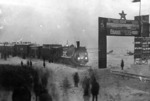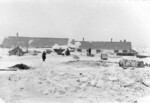Vorkuta Forced Labor Camp
| Type | 4 Prison Camp | |
| Historical Name of Location | Vorkuta, Komi, Russia | |
| Coordinates | 67.514167000, 64.083889000 |
Contributor: C. Peter Chen
ww2dbaseEstablished in 1932, the Vorkuta forced labor camps (132 in all over time) were Gulag-run penal colonies located in the northern Ural Mountains in the Komi Republic region of Russia. They were located in the Pechora Coal Basin north of the Arctic Circle, which was the second largest coal production region in the Soviet Union (after the Donets Coal Basin), and thus many of the prisoners of Vorkuta camps worked in coal-mining and coking related industries. Early in WW2, Vorkuta camps held many prisoners from Poland and the Baltic States. After the German invasion of the Soviet Union, many German prisoners of war were transferred here. Among the more notable German prisoners was Anton Kaindl, commandant of the Sachsenhausen Concentration Camp near Berlin, Germany; he would perish at Vorkuta in 1948. In Jul 1953, prisoners staged a mostly passive strike against the horrendous living and working conditions of the camps; it was broken up by force on 1 Aug 1953, resulting in the death of at least 53 workers. During the Cold War, several Americans were imprisoned here, including US military policeman Homer Cox (abducted in Berlin), Private William Marchuk (abducted in Berlin), and John Noble (arrested in Dresden, Germany), among many others, some of whom were never identified. The Vorkuta Gulag forced labor camps closed in 1962, but many of its former prisoners would remain in the nearby town of Vorkuta, which was established in 1936 to support the camps.
ww2dbaseSource: Wikipedia
Last Major Update: May 2013
Vorkuta Forced Labor Camp Interactive Map
Photographs
 |  |  |  |
Vorkuta Forced Labor Camp Timeline
| 4 Jan 1936 | The town of Vorkuta was established in northern Komi Republic, Russia to support the Vorkuta Gulag forced labor camps. |
| 1 Aug 1953 | Soviet troops fired on striking prisoners of the Vorkuta Gulag camps in northern Russia, resulting in at least 53 deaths. |
Did you enjoy this article or find this article helpful? If so, please consider supporting us on Patreon. Even $1 per month will go a long way! Thank you. Share this article with your friends: Stay updated with WW2DB: |
| WW2-Era Place Name | Vorkuta, Komi, Russia |
| Lat/Long | 67.5142, 64.0839 |
- » 1,150 biographies
- » 337 events
- » 44,024 timeline entries
- » 1,242 ships
- » 350 aircraft models
- » 207 vehicle models
- » 375 weapon models
- » 123 historical documents
- » 260 facilities
- » 470 book reviews
- » 28,616 photos
- » 432 maps
Winston Churchill
Please consider supporting us on Patreon. Even $1 a month will go a long way. Thank you!
Or, please support us by purchasing some WW2DB merchandise at TeeSpring, Thank you!